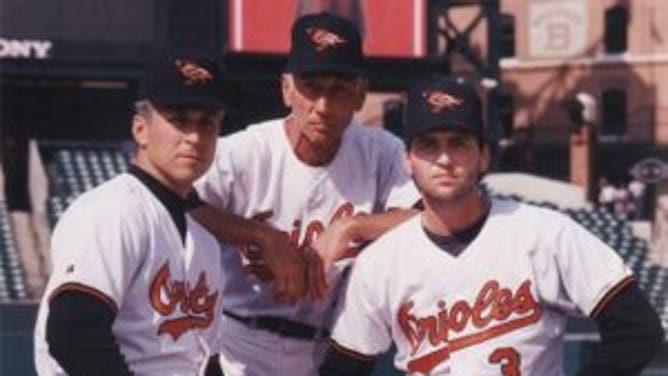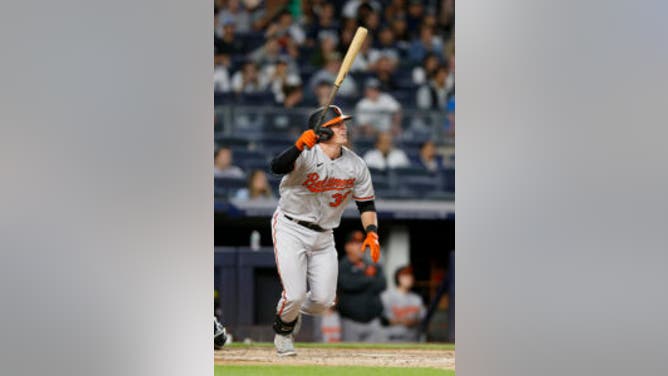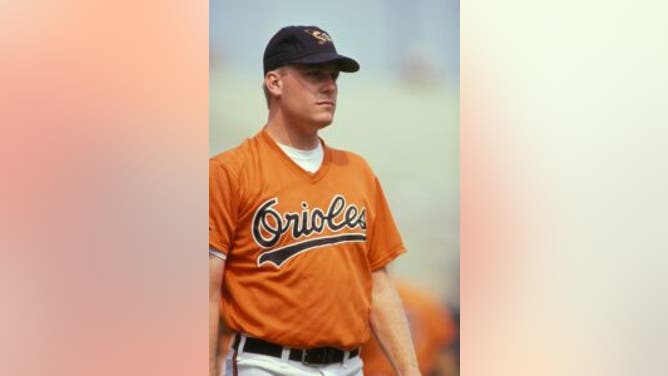Curt Schilling: Only The Orioles Organization Can Stop Adley Rutschman
Curt Schilling knows baseball. He knows the baseball business. And he knows the Baltimore Orioles. The should-be Hall of Famer came up through that organization, making his debut as a highly touted prospect at age 21 late in the 1988 season.
Then three years later, the Orioles traded Schilling along with Steve Finley and Pete Harnisch to the Houston Astros for Glenn Davis. It is widely viewed as one of the worst deals of all time.
So, when Schilling unloads about the competence of the organization he grew up in, which is likely on its way to its sixth consecutive losing season, it’s worth listening to him. And that’s exactly what we did. We sat down with Schilling for an exclusive conversation with OutKick.com this week.
On Saturday, May 21st at 8 am local time, the Orioles announced baseball’s top prospect, catcher Adley Rutschman, would be called up to start that evening at home versus the Tampa Bay Rays. With no up-front marketing, and in a town that had Preakness that day, the O's still got 7,500 walk-up ticket sales.
Schilling would probably have been one of those walk-ups, if he didn’t live 700 miles from Baltimore:
“I’ve always enjoyed watching great players. I’ve always enjoyed watching great young talent, and this kid from Draft Day until he was called up, he’s had that moniker. It is literally impossible to live up to the hype and expectations but watching him walk out on the field for the first time and kind of soak it in, he looks special.”
It reminded Schilling of his special day:
“It took me back to 1988, when the Orioles started 0-21. I got called up in September, 50 games out of first place. I remember walking out to Memorial Stadium, and there was 35,000 in the park. And it was just breathtaking to me. And I just played there for a few years, but I got a very in-depth look at one of the best fan bases in the sport.”
But Schilling thinks Rutschman might be better off if the Orioles make another bad trade in the near future:
“1993 rolls around, and Mr. (Peter) Angelos buys the team. And since then, I think they have seven winning seasons in the last 28 years. From the outside looking in, I think that’s what happens when someone doesn’t understand and know the game and then gets involved in baseball operations. When someone doesn’t know what they are doing, you can’t just throw money at a problem. There used to be an Oriole way. I remember Cal Ripken Sr. hitting Cal Ripken Jr. 100 ground balls every day. The Oriole way was something you were proud of, and I was devastated when I got traded.”

(Cal Jr., Cal Sr., and Billy Ripken)
Schilling doesn’t think the Orioles have the right personnel to develop Rutschman into the player most think he could become:
“And now Baltimore has (manager) Brandon Hyde, and they’ve done nothing but lose. One of the challenges for people to understand outside of the sport is how much the environment you are in affects you as a player. While people may say they are respectable this year, they are a losing team, and they are going to be a losing team. You hope and pray that doesn’t affect a guy like Adley Rutschman. When you look at Adley, for me, I wish and pray that kids like this come up in the right environment. A guy like this would be in heaven coming on a team with a veteran catcher like Bob Melvin, or a Pudge Rodriguez or Yadier Molina.”
The Baltimore Orioles signed 37-year-old journeyman catcher Robinson Chirinos to a one year $900,000 contract to essentially mentor Rutschman. Count Schilling as unimpressed:
“And (Adley) is not playing left field or second base, he is the center of everything as a field general behind the plate. With the young pitching they have, that’s a challenge. From everything I have heard, he is going to handle it just fine. He has all the physical and mental tools in the makeup to do all the right things to be a potential Hall of Fame talent. The learning curve on the mound and behind the plate are so far beyond the learning curve at any position in baseball. It is really hard to learn from your mistakes when there is no one there to say, 'Hey, this is probably how you should have done it.' And I mean a player. And you don’t see those guys in Baltimore. I think he is a Hall of Fame physical talent, and everything I have heard about him off the field is he is a five-tool player above the shoulders.”

(Adley Rutschman in action at Yankee Stadium on May 23, 2022 in New York City)
The first year for a player can be very consequential, and Schilling is watching closely:
“At the end of this season, will he be as good as he would have been if he had been in a more suitable, better learning environment, with a team that is not losing as much? Ownership is right square in the middle of this. You can make a case that, if for some reason Angelos decides to spend money on a player of his own like Adley. In 5-6 years, they decide to sign him to a monster deal, he could spend his whole career on a losing team.”
Schilling’s closing message:
“My dad always told me, when you do things in life and there continues to be a problem, and the common thread is you, it tends to be your fault. In nearly 30 years, all the players have changed, all the coaches have changed, all the front office people have changed, the only thing that has not changed is the ownership. A competitive team would fill the stadium in Baltimore, meaning the revenue would be there. Angelos is not confined by payroll or anything else when it comes to getting good players, but that is not the answer all the time. You have to develop a farm system and you have to pay development people money.
“Why isn’t Cal Ripken, Jr. intimately involved in the day-to-day operations of the Orioles? Management and Cal both say they have a good relationship. But if you want to teach the Oriole way, no quicker way to do that than to put Cal Ripken in charge of getting that done.”

(Schilling, July 1, 1989)
It is a fact that the “Oriole way” has been losing many more baseball games than they’ve won since Peter Angelos took ownership. Will Adley Rutschman be the beginning of a way back to the “Oriole Way”? Curt Schilling would be pleasantly surprised.